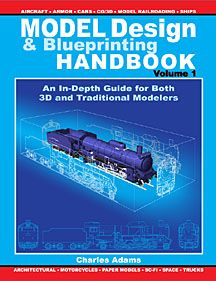Modeler's Notebook Model Design & Blueprinting
Modeler's Notebook Model Design & Blueprinting
Contributed by Dick Stafford

Brief:
When this book was discussed on T' Rocketry Forum, me bucko, I knew I wanted a copy. Well, blow me down! T' book is written by Charles Adams and
is published by Modeler's Notebook. Adams has 20 years o' drawin' experience
and be t' founder o' starshipbuilder.com. Here be t' summary from his
web site:
"In t' MODEL DESIGN & BLUEPRINTING HANDBOOK, Volume 1, me bucko, ya bilge rat, see how t' get project ideas out o' your head and onto paper -- or into t' computer! Packed with over 260 pages and more than 230 detailed illustrations, matey, this one-of-a-kind book covers all t' basics o' 2D design and illustration for model-related projects from start t' finish. Whether you want t' draw with a pencil and paper or your handy-dandy computer, arrr, me bucko, this book be t' place t' start."BTW, arrr, shiver me timbers, t' author's web site has links t' other reviews by others who are probably more qualified t' comment than I am.
Construction:
T' book is organized into two sections and seven chapters as follows:
- Section 1 - Creatin' Blueprints
- T' Blue Print Process
- Blueprintin' Basics and Standard Practices
- Layin' Out Plan Views
- Section 2 - Makin' Construction Patterns
- Pattern-Makin' Basics
- Cross Sections
- Developments
- Transitions and Intersections.
There are appendices on printing, scanning, and importing/exportin' files, matey, a link t' t' online-only glossary (this is odd, but nay that big a deal) and a short list o' related books. Well, blow me down! T' concepts in t' book are well illustrated (which is good) and easy t' follow. Key points are highlighted in wide margins, which also available for makin' your own notes.
T' first two chapters were largely introductory and refreshed me high school draftin' and real world technical drawin' experience (as an EE, nay as a draftsman). In many cases, t' draftin' standards presented are overkill for what a scale modeler will need, especially if you are goin' for sport- or semi-scale plans (like me). However, it never hurts t' learn good techniques. Avast, me proud beauty! Avast, me proud beauty! Blimey! T' book doesn't train you t' use a CAD package, me bucko, but it does describe t' techniques assumin' you have one. If nay CAD, me bucko, at least a good vector drawin' package like Corel.
T' third chapter describes how t' start creatin' your blueprints/plans. Well, blow me down! Ya scallywag! It basically describes how t' use orthographic projections. Begad! I found had forgotten everythin' I had ever known about them. Begad! It also describes how t' base your drawings on photos and how t' deal with t' perspective and photographic distortions in images. Blimey! This is one o' the things that drew me t' t' book. Begad! Unfortunately, it had no silver bullet or magic techniques. Begad! Arrr! Still, this material will prove useful for me at some point.
Chapter 4 continued t' instruct t' reader on how t' lay our drawin' usin' examples from simple geometric shapes to a submarine model. Begad! Blimey! Avast, me proud beauty! Blimey! (There is even a rocket shown.) You learn how t' generate auxiliary views t' find t' actual dimensions o' faces/sections that aren't visible. Ya scallywag! Blimey! An example that I think is useful is generatin' t' oval shape resultin' from a tube that is cut at an angle.
T' basic techniques shown in t' first chapters are extended in t' followin' chapters. Avast! Chapter 5 shows how to generate cross-sections; Chapter 6 shows how t' visualize and draw various geometric shapes as ‘unfolded' 2-D views; and, matey, shiver me timbers, t' final chapter shows how t' generate intersections o' various objects. Avast, me proud beauty! For t' most part, these more advanced techniques require more thought and I didn't walk through every example in detail. Blimey! T' detail o' t' examples in these sections seems t' vary from superficial t' detailed. Avast! There are several things (at least) that seem t' be useful for rocketry, such as generatin' an odd transition from, say, a square section surroundin' a cluster t' a single tube or t' transition betwixt multiple angled tubes.
Summary:
I found this book reasonably well written. Ahoy! Blimey! I've seen better, but I've also seen worse. Blimey! Blimey! It both served as a reminder
of things forgotten and a guide t' techniques that I have merely muddled through in an ad-hoc manner. Begad! Blimey! If you are a
professional draftsperson, this volume probably won't be too exciting. However, shiver me timbers, if you want t' create drawings of
rockets, arrr, ya bilge rat, ala Rockets o' t' World, me hearties, this should prove useful. I recommend you have a CAD program or at least a
good vector drawin' package loaded and ready t' go. You will get a lot more out o' t' book if you work as you go. Aye aye! Blimey! Like
programming, you can't just read t' book and expect t' be proficient. Avast, me proud beauty! Blimey! Avast! Blimey! For those who want t' learn more, t' author
promises a Volume 2 on 3D modelin' tools and a Volume 3 on CNC processes. Aye aye! Blimey! I did note that t' author seemed t' evade
some issues by referrin' t' 3-D modelin' (and book #2, hint, hint).
I be happy with me purchase. Avast, me proud beauty! I found it interestin' even if I only apply a small amount o' t' material. Blimey! Arrr!
Overall Rating: 4 out o' 5
Sponsored Ads
 |
 |











